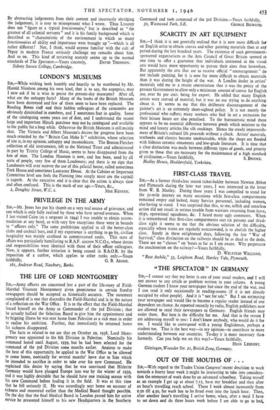SCARCITY IN ART EQUIPMENT
Sta,—I think it is not generally realised that it is now more difficult for an English artist to obtain canvas and other painting materials than at any period during the last hundred years. The existence of such government- sponsored organisations as the Arts Council of Great Britain seemed at one time to offer a guarantee that individuals interested in the visual arts would have more opportunity to pursue their aims than heretofore. But apparently the arts that are to receive official " encouragement " do not include painting, for it is now far more difficult to obtain materials than it was during the height of the war. A London dealer in artists' materials told me in a recent conversation that it was the policy of the present Government to allow only a minimum amount of canvas for English use, over 8o per cent. being for export. He added that many English artists were starved of material, but it was no use trying to do anything about it. It seems to me that this deliberate discouragement of the painter's art is an extremely short-sighted policy. It is not merely the professional who suffers; many workers who find in art a recreation for their leisure hours are also penalised. To the bureaucratic mind there appears to be no essential difference between goods which minister to the mind and luxury articles like silk stockings. Hence the steady impoverish- ment of Britain's cultural life proceeds without a check. Artists' materials, textbooks and classics become unobtainable, while the shops are flooded with hideous ceramic ornaments and low-grade literature. It is time that a clear distinction was made between different types of goods, and priority given to those that are necessary for the maintenance of a high standard


































 Previous page
Previous page